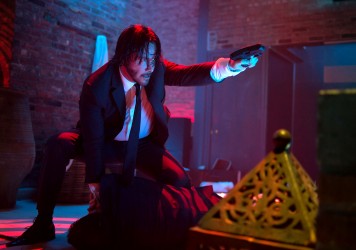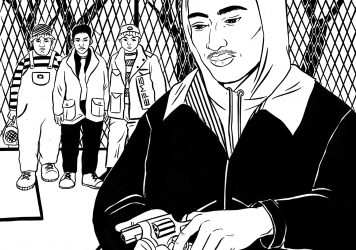Nick Broomfield rakes over the coals of the Biggie vs 2Pac saga but doesn’t find anything particularly new.
Barely a week goes by without the release of a new film, podcast, book or documentary series excitedly examining the killings of gangster rap deities Biggie and 2Pac. The latest, Last Man Standing, sees veteran British doc maker Nick Broomfield return to Los Angeles to probe the two unsolved murder cases, acting as a continuation of sorts of his probing 2002 film, Biggie and Tupac.
Broomfield is chaperoned by plucky Compton local Pam Brooks, as the pair speak to former gang members connected with Suge Knight, the infamous former Death Row Records CEO who was driving the car that artist Tupac Shakur was fatally shot in on 7 September, 1996.
We subsequently learn about the younger Knight, who liked his chicken cooked a certain way, and how as an adult he kept black piranhas, apparently signifying his James Bond villain credentials. The problem is that Broomfield is desperate to arrange the puzzle pieces so that the disgraced Knight is positioned as the sole bogeyman of the piece, and as such it doesn’t feel like we’re given a balanced account of the events that transpired.
The first half of the documentary revisits familiar ground, recycling tropes and stories about Death Row’s Tupac years that have been in the public domain for decades. Tupac is presented as the doe-eyed victim, led astray by Knight’s gang politics, even though archival photos clearly show them degrading women side-by-side.
As soon as someone suggests an alternative theory – like a historically violent Tupac willingly leaning into Blood affiliation, P Diddy’s rival Bad Boy Records also being surrounded by murderous gang members, or a generous Knight spending millions of dollars to feed single mothers and employ homeless people – it’s quickly superseded by a more thorough anecdote by a hanger-on that eagerly positions Knight as the devil incarnate.
The documentary really gets going when it moves past Tupac hagiography and the events of his Las Vegas shooting, which, by this point, has long been unofficially solved. There’s some fresh leads on the unsolved murder of Biggie Smalls in March of 1997, with corrupt LAPD officers linked to Knight and Death Row once again fingered as likely culprits.
Broomfield leans heavily on clips from his previous Biggie and Tupac documentary, which contains fascinating insight from the late Russell Poole, an LAPD officer whose career came to an end after he attempted to expose dirty cops he alleged made money on the side as contract killers and security guards. The defence of Poole is this documentary’s most heartening moment, and it’s a shame that this segment isn’t explored more deeply.
Had Broomfield focused more on Biggie and looked at how white institutions are often complicit in the demise of Black icons, whether through wilful ignorance (in the case of Interscope) or systemic corruption, then this film might have been worthwhile. As things are, Last Man Standing feels like a cut-and-paste job, rushed to market to tap into a growing demand for ’90s nostalgia.
And much like various other filmic explorations into the Biggie and Tupac murders, Broomfield’s film, replete with cheap G-Funk instrumentals and random archive shots of black men being arrested by police officers, feels more than a little voyeuristic. One story about white execs at Death Row’s parent company, Interscope, ignoring the screams from beatings next door is undeniably horrifying, but it’s nothing new, with online 2Pac sleuths like DJ Vlad and The Art of Dialogue revealing juicier stories about the West Coast rap label with each new interview they publish. Arguably, these YouTubers are now beating Broomfield at his own investigative game.
Published 29 Jun 2021
Broomfield revisiting familiar ground is an intriguing prospect.
Easy enough to sit through, but there’s nothing here you wouldn’t get from a late-night YouTube binge.
A largely recycled documentary that fails to justify its existence.

By Thomas Hobbs
The influential New Jersey rap producer on the impact of Larry Clark’s notorious teen movie.

Keanu Reeves’ no-nonsense anti-hero has struck a chord with a new generation of rappers.

By Thomas Hobbs
With its thrilling performances and damning anti-gun message, Ernest Dickerson’s portrait of America continues to touch a nerve.